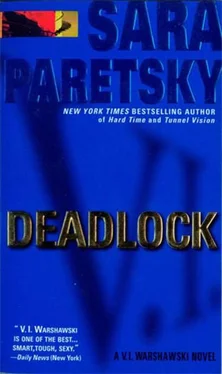I hadn’t had much appetite while my shoulder was in pain and I’d dropped five or six pounds. This morning I felt better and sat down to pecan waffles, sausages, strawberries, and coffee.
I was a latecomer in the little restaurant and the middle-aged waitress had time to talk. As she poured my second cup of coffee I asked her where I could rent a car. There was an Avis place in town, she said, but one of her sons had a couple of old cars he rented out if I didn’t need anything too fancy. I told her that would be fine as long as they had automatic transmissions, and she trotted off to call her son.
Roland Graham his name was, and he spoke with a Canadian accent, a lilting drawl that sounds as if it has a trace of Scots buried in it. His car was a ’75 Ford Fairmont, old but perfectly clean and respectable. I told him I’d only need it until the next morning. The fee, payable in advance in cash, was thirty dollars.
The Holiday Inn was in the heart of town. Across the street was the largest Presbyterian church I’ve ever seen. A modern city hall faced the motel, but the street behind us had a lot of run-down stores and premises to let. As I got down to the waterfront the stores gave way rapidly to bars and girlie joints. I’ve often wondered whether seamen really have the primitive appetites port towns attribute to them, or whether they go to sleazy joints because that’s the only thing the locals offer.
Finding the Lucella turned out to be a larger problem than I’d anticipated. Thunder Bay is an enormous port, even though the town itself doesn’t have more than a hundred thousand people in it. But much of the grain shipped by water in North America passes through that port heading east and south, and the lakefront includes mile upon mile of towering elevators.
My first thought had been to stop in at each elevator to see if the Lucella was docked there, but the miles of towers made that seem like a waste of time. I did go into the yard of the first one I came to. After bumping around the mud-filled ruts, I found a tiny, green-sided office. But a harassed man inside handling the phone assured me that he didn’t have the foggiest idea of where the Lucella was; he only knew she wasn’t there.
I went back into the town and found the local newspaper. As I’d hoped, it listed the ships that were in port and where they were. The Lucella was docked at Elevator 67, the Manitoba Grain Co-op.
There didn’t seem to be any logical order to the yard numbers. I was near number 11, but I went past yard 90 without seeing the Manitoba Grain Co-op and wasted time backtracking. I finally found it another two miles down the road, well past the town.
I turned the Ford into the gravel yard, my heart pounding with nervous anticipation. The Manitoba elevator was enormous, some two hundred giant paper towel tubes banked together. Huge though it was, it didn’t dwarf the ship tied up on its eastern end. The Lucella ’s red hulk gleamed sleekly in the late morning sun. Above her, like clouds covering and revealing Mount Everest, hovered a mass of white smoke. Grain dust. The Lucella was loading.
The yard was a mess of gravelly mud. In the corners of the elevator, out of the sun’s reach, a gray-white residue of winter was still melting. I parked clear of the more obvious holes and picked my way through the mud, the metal shards, pasteboard, and grain clumps making up the now familiar elevator scene.
The Smith & Wesson dug uncomfortably into my side as I climbed the Lucella ’s ladder to the main deck. I stopped for a minute at the edge of the hardhat area to survey the busy scene and ran a surreptitious finger under the leather holster digging into my diaphragm. Squinting at the whitened figures, I couldn’t be sure if any of my quarry were present. I thought I might recognize Bledsoe’s stocky body, but it was hard to say.
I went into the pilothouse and climbed the four flights to the mahogany-paneled bridge. Only the first mate, Keith Winstein, was there. He looked up in surprise when I came in. He recognized me at once.
“Miss Warshawski! What-is Captain Bemis expecting you?”
“I don’t think so. Is he around? And what about the chief engineer and Martin Bledsoe?” It would be really annoying if Bledsoe had returned to Chicago.
“They’re all in Thunder Bay this morning. Going to the bank, doing that kind of business. They won’t be back until late afternoon. Not until right before we sail, I’m afraid.”
“You’re sailing today?” I sat down on one of the mahogany stools. “Your office said you’d be here through tomorrow.”
“No, we made good time up from Detroit. Got here a day early. Time is money in this business, so we started loading last night at midnight. We’ll finish around four and sail at five.”
“Any idea where I can find Bledsoe or Sheridan?”
He shook his head regretfully. “Everyone keeps bank accounts in Thunder Bay because we’re here so often. This is a good chance to catch up on personal affairs-I’ll be taking off myself for a few hours as soon as the second mate gets back.”
I rubbed my forehead in exasperation. “Where do you go from here?”
Winstein was getting a little irritated. “We take this load to St. Catharines, at the other side of the lakes. Why do you ask?”
“What’s your route, I mean-do you stop anyplace along the way where I could get off?”
The first mate looked at me strangely. “If you’re thinking of sailing with us, you’ll have to clear that with the captain, Miss Warshawski.”
“Yes, well, let’s assume he’s going to give his permission. Where’s the nearest place I could get off?”
He shook his head. “There isn’t anyplace on board for you to sleep-Mr. Bledsoe’s in the stateroom.”
I started to feel my temper rising. “I’m not asking for a place to sleep. That’s why I want to get off at the nearest place possible.”
“I guess that would be Sault Ste. Marie,” he said dubiously. “You could get off when we’re at the bottom of the lock. But we won’t reach there until three tomorrow afternoon, at the earliest. You’d still have to find someplace to spend the night.”
“Oh, never mind that,” I said impatiently. “I’ll lie down on the couch here in the bridge if I need to. But I’ve got to talk to the captain and Bledsoe. To Sheridan, too. And I’m damned if I’m going to fly around the country on the off chance of meeting up with them someplace.”
“It isn’t really my decision,” Winstein said pacifically.
“You’ll have to talk to Captain Bemis.” He returned to his papers and I left the bridge.

I took the Fairmont back to the Holiday Inn, singing “A Capital Ship for an Ocean Trip” and “The Barbary Pirates.” I repacked the little canvas bag and checked out, leaving a note for Roland Graham with the Ford’s keys at the counter. It was one o’clock. If the Lucella wasn’t sailing until five, I might as well get some lunch.
By the time I’d eaten and found a taxi to take me out to Elevator 67 it was after three-thirty. The midday sun made the air hot enough for me to take off my sweater and stuff it into my canvas bag before once more climbing the ladder to the Lucella ’s main deck.
They had just finished loading. The heavy grain chutes were being hauled into the elevator from above. Under the second mate’s direction, men began operating two little deck gantries to put the hatch covers back onto the hold openings. One man worked each crane, using controls in front of a small seat on the starboard side. He lifted the hatch cover while two seamen steadied it at either end-they were very large, unstable steel lids. Then he lowered the cover while the other two fitted it onto some twenty or thirty protruding bolts. The three would move along to the next cover while a fourth seaman followed behind with an enormous wrench, screwing all the bolts into place.
Читать дальше













